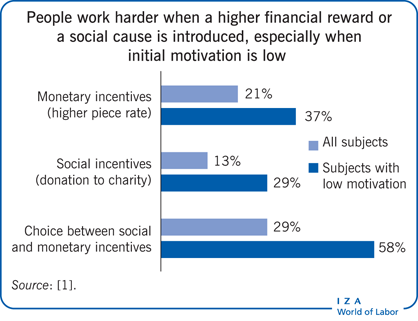Elevator pitch
Employees show more commitment to an employer that promotes the greater good, and they work harder too. Moreover, many people are willing to give up some of their compensation to contribute to a social cause. Being able to attract a motivated workforce would be particularly important for the public sector, but this goal remains elusive. Indeed, there is evidence for the public sector that paying people more or underlining the career opportunities (as opposed to the social aspects) associated with public sector jobs is instrumental in attracting a more productive workforce, without having a negative impact on intrinsic motivation.
Key findings
Pros
Employees work harder and are more motivated when their job is associated with a social cause.
Many people are willing to give up some of their private compensation to contribute to the greater good.
Survey results show that socially responsible firms are more attractive to jobseekers.
Attracting a motivated workforce is particularly important for the public sector.
In the public sector, randomized controlled trials suggest that extrinsic incentives (pay, career options) do not crowd out intrinsic motivation to serve the public interest.
Cons
What represents a good cause may be subjective, and a good match in terms of mission between workers and their firm is crucial.
Attracting a motivated workforce can be challenging, and the public sector appears to have had limited success.
Highlighting the social aspects of a job in the public sector may not be an effective way to recruit motivated workers.
The evidence on workers’ motivation is limited, affecting the generalizability of study findings.
